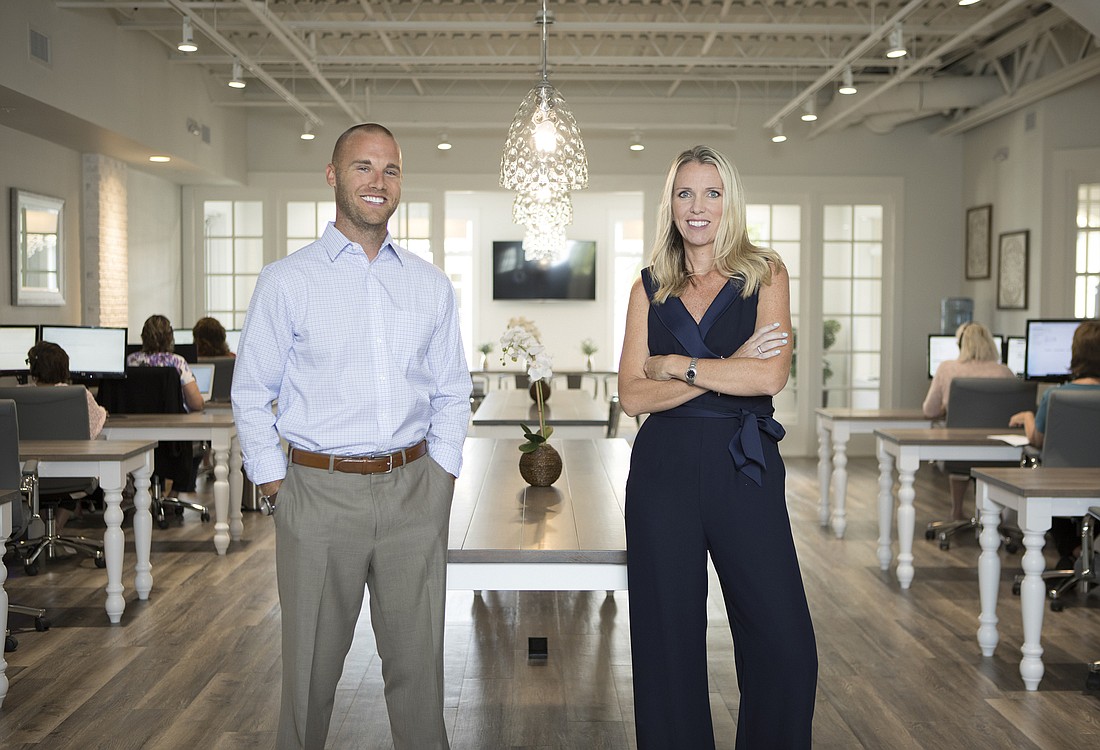- December 22, 2024
-
-
Loading

Loading

Husband and wife business owners Adam and Kim Peacock had more than the usual entrepreneurial worries — happy clients, software bugs, etc. — on their mind late last December.
That’s because a week before Christmas, the Sarasota parents of two young children got some dreaded news: Their then 4-year-old daughter, Kinsley, was diagnosed with a rare and aggressive form of eye cancer, retinoblastoma.
Running their Osprey-based business, physical therapy billing and electronic medical records practice StrataPT, was abruptly pushed down the priority list. The lone bright spot, the couple says was that employees essentially and successfully took over for six months while the Peacocks cared for Kinsley.
“We have a well-oiled machine here,” Adam says. “Our technology is extremely robust and unlike anything else in our industry, but we've always believed our employees are our greatest asset.”
“It’s a reflection of the strong staff and support we have,” Kim adds.
With Kinsley cancer-free — she rang the chemotherapy bell April 26 — the Peacocks are back to running and growing StrataPT. In doing so, they have the perspective of a key business lesson: preparation for any unseen situation.
The couple has learned other key lessons over the past decade while building StrataPT to a 22 employee-firm, where sales are up at least 50% in 2019 so far over 2018. (The Peacocks decline to disclose specific revenue figures.) The list includes over-doing it on both training employees and initiatives to keep employees engaged and happy. Another key? Finding subtle ways to connect with clients and, in many cases, cultivate raving fans.
‘We had no clients. We had nothing. Doing good work by our clients was how we marketed the business. That’s how we grew.’ Kim Peacock, StrataPT
“We’ve never taken a loan, and we’re debt-free,” Kim Peacock says. “Everything we’ve been able to do here is from good, old-fashioned grit.”
Kim Peacock, 38, started the company in 2010 after overseeing business operations for a physical therapy clinic with locations in Florida and Ohio. She was stretched in many directions with a variety of vendors to get things done. “I saw there was a lack of a systems available to a PT practice,” she says. “It was a conglomeration of things, and it wasn’t efficient. I thought there really was a need and a market for that.”
She started the business with one employee in a 200-square-foot office. “We had no clients; we had nothing,” she says. “Doing good work by our clients was how we marketed the business. That’s how we grew.”
The company today handles an array of services for PT clinics spread through 38 states. Services include billing, documentation, scheduling, practice management and new practice startup consulting and assistance. It also works with practices that provide speech therapy and occupational therapy services. It gets paid a percentage — normally 6 to 8% — of the total money it collects for clients from payment providers, which are mostly insurance companies.
“Some companies just to do software; some just do billing,” says Adam Peacock, 35, who joined StrataPT in 2014 after working in pharmaceutical sales for Pfizer. “Having one company do all the services from patient intake to payments has really worked for us.”
The fees StrataPT collects are higher by a few percentage points than some competitors, Kim Peacock says, but the payoff comes in several ways. For one, the StrataPT collection team, she says, is relentless — their nickname is the sharks — and will make 40 calls for $10, if necessary. So the total pool of money is higher, like an example Adam Peacock cites of a new client in North Carolina. That practice collected $24,000 in gross receivables in March 2018 without StrataPT and $35,000 this past March with StrataPT — up 46%.
Another StrataPT benefit, the couple says, is the response time when clients have a question. Each StrataPT client has an account manager who uses an internal messaging system to communicate with them. StrataPT account managers are compensated, in part, on the speed of their response time to clients. Kim Peacock says that although competitors might take two or three days to return calls, StrataPT addresses situations within 15 minutes in most cases.
A core challenge is customer education — to make all the things the company does for clients visible earlier in the sales process. Adam Peacock says, “We want to move more of the behind-the-curtain stuff we do upfront.”